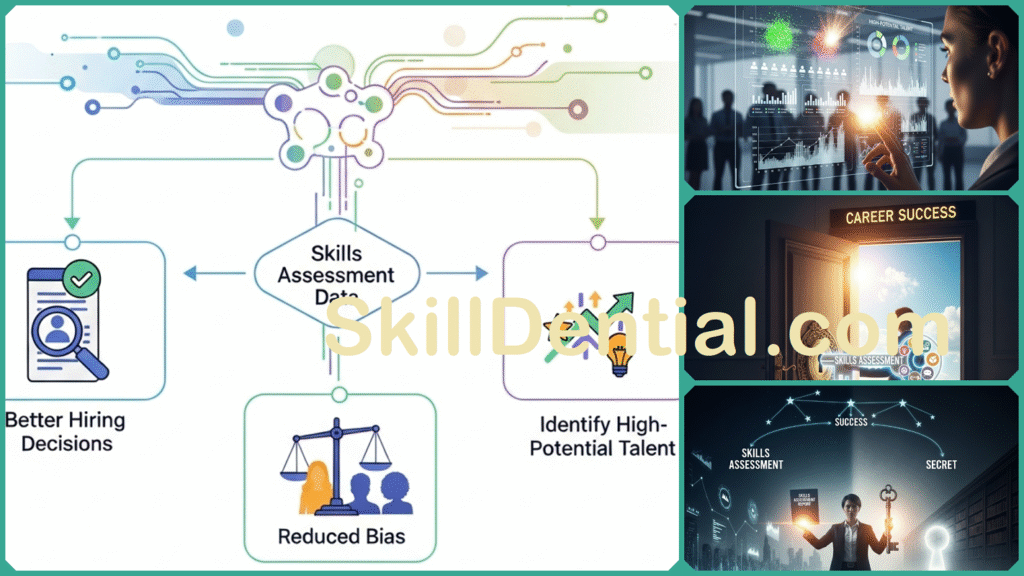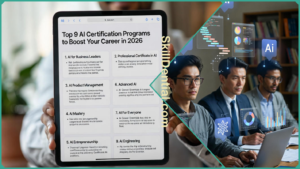In today’s highly competitive and rapidly evolving job market, having a clear understanding of your unique capabilities and strengths is more crucial than ever before. Whether you are a job seeker actively searching for new opportunities, a recent graduate just beginning to navigate the early stages of your career, a mid-career professional who may be encountering a plateau or looking to advance further, or even a hiring manager tasked with selecting the very best talent for your organization, conducting a comprehensive skills assessment is essential.
This powerful and versatile tool acts as the essential key to unlocking significantly greater career success, meaningful personal growth, and comprehensive professional development throughout all stages and phases of one’s entire career journey.

This carefully structured and methodical process objectively identifies existing strengths, uncovers hidden gaps, and creates a detailed and clear roadmap designed to guide professional development and ensure hiring excellence throughout the organization.
This article thoroughly demystifies the concept of skills assessments, delving into their numerous benefits and current trends. It also examines how these evaluations can significantly empower individuals in their career journeys while simultaneously transforming organizations for the better. By understanding skills assessments, readers can gain valuable insights into their potential to enhance professional growth and drive organizational success.
What Is a Skills Assessment?
A skills assessment is a systematic process used to evaluate an individual’s abilities, knowledge, and competencies in specific areas. It encompasses both technical skills (such as job-specific knowledge and practical tasks) and soft skills (like communication, teamwork, and problem-solving).
Unlike resumes or interviews, which primarily depend on self-reported experience or subjective evaluation by others, skills assessments offer objective and measurable data on what a person is truly capable of doing. These assessments provide a clear, unbiased picture of an individual’s actual abilities and competencies, going beyond mere claims or impressions.
The assessment methods vary and can include standardized tests, practical assignments, simulations, psychometric evaluations, role-playing scenarios, interviews, and 360-degree feedback from peers, managers, and subordinates.
For individuals, this process fosters self-awareness by clearly highlighting strengths and identifying areas needing improvement. For employers, it provides an unbiased and factual insight into candidate competence and cultural fit, making recruitment and talent management more effective.
A thorough skills assessment typically involves multiple key components that work together to provide a detailed evaluation:
- Objective criteria to ensure consistency and fairness,
- Self-assessment encourages personal reflection,
- Peer and manager assessments offering diverse perspectives,
- and feedback with development planning to guide future growth.
This approach aligns closely with the rapidly growing skills-first hiring trend that is gaining significant momentum across various industries, where demonstrated practical capabilities and hands-on experience are valued far more than traditional formal credentials or academic degrees.
As a result, skills assessments have become an absolutely indispensable and essential tool in evaluating candidates effectively, playing a crucial role in the decision-making process within today’s dynamic and ever-evolving modern workforce.
In Summary
A skills assessment is a comprehensive and systematic process designed to accurately measure an individual’s real capabilities and competencies. This valuable evaluation tool assists both individuals and organizations by providing clear, objective insights that support more informed and effective decision-making.
By understanding these genuine skills, people can better plan their career paths, enhance their professional development, and achieve greater success in their chosen fields. Similarly, organizations benefit by identifying the strengths and areas for growth within their teams, enabling smarter talent management and strategic workforce planning.
Why Skills Assessments Matter for Job Seekers and Graduates
Skills assessments matter greatly for job seekers and recent graduates because they offer essential clarity about their abilities, boost confidence in their qualifications, and provide a significant competitive advantage in an increasingly crowded and challenging job market.
Clarifying Your Professional Value
Many job seekers and graduates face uncertainty about their actual marketable skills and how to communicate their value to employers. A skills assessment offers a clear, precise inventory of strengths and weaknesses, helping individuals understand which skills they truly possess and which need development.
This heightened level of self-awareness significantly boosts confidence and empowers job seekers to more effectively target roles that truly align with their genuine abilities and long-term aspirations, allowing them to stand out more authentically and compellingly throughout the entire application process.
Career Path and Growth Alignment
A key advantage for graduates and job seekers is how skills assessments illuminate potential career paths by aligning personal motivations, interests, and proficiencies. Assessments guide individuals away from unsuitable or unfulfilling roles by pinpointing where their skills naturally fit.
This approach ensures that candidates concentrate their attention on opportunities that are most likely to satisfy them and contribute to their long-term success, which is an especially important consideration for individuals who are just beginning their careers or are seeking to make a significant pivot in their professional paths.
Improved Job Prospects
Employers are increasingly relying on skills assessments as part of their hiring processes, preferring demonstrated capabilities over just degrees or experience. Candidates who can present objective evidence of their skills through assessments signal that they are job-ready, reducing uncertainty for employers in making hiring decisions.
This evidence helps candidates stand out, making them more attractive hires. Additionally, skill-based hiring widens access for diverse candidates, including those without traditional educational backgrounds, creating more inclusive opportunities for skilled individuals.
In Summary
Skills assessments play a crucial role in empowering job seekers and recent graduates by helping them clearly define and articulate their unique value in the workforce. These assessments enable individuals to identify and target career paths that best align with their strengths and interests, ensuring a more focused and strategic job search.
Additionally, by providing concrete, verifiable proof of their abilities, skills assessments significantly enhance their attractiveness and competitiveness in a crowded and challenging job market. This tangible evidence of competence helps candidates stand out to potential employers, increasing their chances of securing desirable positions and advancing their careers successfully.
How Skills Assessments Benefit Early to Mid-Career Professionals
Skills assessments provide numerous valuable benefits for early to mid-career professionals who are eager to advance and grow within their chosen careers. These evaluations help individuals identify their strengths and areas for improvement, enabling them to make informed decisions about their professional development paths and career goals.
Identifying Skill Gaps for Advancement
Professionals who find themselves feeling stuck or stagnant in their careers often struggle because they lack a clear understanding of which specific skills are necessary to advance and move forward effectively. A comprehensive skills assessment offers a valuable, data-driven analysis of an individual’s current competencies, clearly highlighting any gaps or deficiencies that may be preventing them from achieving promotions, securing raises, or unlocking new career opportunities.
This kind of clarity is essential for overcoming career plateaus, as it allows individuals to focus their personal and professional development efforts on the specific areas that truly matter and will have the greatest impact on their future growth and success.
Creating a Roadmap for Professional Development
An effective skills assessment not only identifies an individual’s strengths and weaknesses with clarity but also provides detailed and practical actionable recommendations. These recommendations serve as a foundation for creating targeted and personalized learning or training plans, allowing professionals to upskill more efficiently and purposefully.
By concentrating efforts on specific areas needing improvement, this focused approach ensures that the time and resources devoted to professional development are used to their maximum advantage. As a result, individuals can accelerate their progress toward achieving their career goals more effectively.
Additionally, HR teams or career coaches frequently play a crucial role in assisting professionals by helping develop comprehensive short-, medium-, and long-term career plans that are thoughtfully based on the results of the assessment.
Increasing Salary Potential
Research shows that individuals who actively invest time and effort in identifying and developing critical skills tend to achieve significantly higher salaries and secure better roles within their industries. Employers place great value on candidates who demonstrate up-to-date and relevant competencies, especially in rapidly evolving and competitive industries such as technology.
Skills assessments offer clear and objective evidence of an individual’s abilities, which significantly strengthens their negotiating power in various professional situations. This concrete proof not only enhances their overall marketability in the competitive job market but also substantially increases their opportunities for career advancement and professional growth.
By clearly demonstrating verified competencies, individuals are able to confidently and effectively showcase their qualifications and skills to potential employers or clients. This process not only highlights their capabilities but also significantly increases their chances of opening doors to new, exciting, and better career opportunities and professional prospects.
Additional Benefits
- Enhanced self-knowledge about personal aspirations, strengths, and opportunities for growth increases job satisfaction.
- They help align projects and roles with individual interests, leading to greater engagement and performance.
- For organizations, assessments aid in optimizing human resources and preventing turnover by supporting tailored career development.
In Summary
Skills assessments serve as an essential and highly valuable tool for mid-career professionals who are actively seeking advancement opportunities. These assessments play a crucial role by clearly identifying specific development needs, helping to pinpoint areas for improvement, and guiding tailored learning pathways.
By effectively leveraging these valuable insights, professionals have the opportunity to strategically and thoughtfully enhance their skills and competencies in a targeted manner. This deliberate development not only strengthens their capabilities but also significantly increases their overall value and competitiveness. As a result, they become much better equipped to navigate and succeed in the constantly changing and rapidly evolving job market landscape.
Skills Assessments in Hiring and Team Development: Benefits for Employers
Skills assessments offer a wide range of important benefits for employers throughout the hiring and team development processes. They play a crucial role in identifying the right candidates and ensuring that team members possess the necessary capabilities to perform effectively.
Objective Evaluation and Better Candidate Selection
Traditional hiring methods such as resumes and interviews often fall short due to their subjective nature and reliance on self-reported information. Skills assessments offer an objective, standardized way to measure candidates’ actual abilities in both technical and non-technical skills.
This leads to more accurate comparisons, better hiring decisions, and helps reduce costly mis-hires. Companies using skills assessments have reported reducing hiring errors by up to 30%, ensuring only qualified candidates move forward.
Identification of High-Potential Talent
Skills assessments uncover hidden potential in candidates who may come from non-traditional or unconventional backgrounds, bypassing typical credential biases. By focusing on demonstrated competencies, employers can tap into a more diverse talent pool, identifying candidates who have the skills needed but might be overlooked through traditional hiring filters.
This approach strongly supports and advances organizational diversity and inclusion goals, fostering a more inclusive culture. At the same time, it significantly enhances and improves the overall capability and effectiveness of the team.
Enhanced Training and Succession Planning
Regular skills assessments within an organization help identify existing skill gaps and strengths across teams. This data enables the creation of tailored training programs that target specific development needs, ensuring effective use of organizational learning resources.
Additionally, assessing team competencies assists in succession planning by identifying which employees are ready for promotion and which require further growth, boosting retention and long-term organizational success.
Additional Employer Benefits
- Streamlines hiring by quickly screening candidates, decreasing recruiter workload, and time-to-hire.
- Reduces unconscious bias by focusing solely on demonstrated skills and proficiencies.
- Improves new hire onboarding by highlighting training needs upfront.
- Enhances overall workforce productivity and satisfaction through targeted development programs.
Skills assessments provide employers with valuable, objective, and actionable insights that significantly enhance the accuracy of hiring decisions. These assessments play a crucial role in supporting diversity initiatives by ensuring fair and unbiased evaluation of candidates.
Additionally, they help optimize team development by identifying strengths and areas for growth, which contributes to more effective succession planning. As a result, skills assessments have become indispensable and highly effective tools for modern talent management strategies.
Current Trends in Skills Assessments
Current trends in skills assessments are rapidly evolving and transforming at an unprecedented pace, primarily driven by significant technological advancements and the continuously shifting priorities of the modern workforce.
These significant changes are fundamentally reshaping the ways in which organizations assess, evaluate, and develop talent within an increasingly dynamic and fast-evolving professional landscape. As the business environment continues to shift rapidly, companies must adapt their talent strategies to meet new challenges and opportunities effectively.
AI Integration and Advanced Analytics
Artificial intelligence is revolutionizing how skills assessments are developed, scored, and analyzed. AI-driven tools enhance precision and fairness by detecting response patterns, minimizing bias, and providing deeper data insights. These tools enable real-time and adaptive assessments that customize the difficulty and focus based on candidate performance.
By the year 2024, approximately 78% of organizations had adopted AI-powered skill assessments as a core part of their hiring and development processes. This widespread use of advanced technology significantly enhanced hiring accuracy, improving it by an estimated 10-20%.
In addition to streamlining recruitment, these AI-driven assessments also played a crucial role in enabling organizations to create more personalized and effective learning and development plans tailored to the unique needs of each employee.
Skills-First Hiring Approach
The trend toward skills-first hiring continues to gain momentum in 2025, with more companies shifting from rigid degree and title requirements to focusing on demonstrated abilities through certifications and hands-on experience.
About 45% of employers are moving away from traditional degree requirements in key roles, increasing access to talent from diverse educational and experiential backgrounds. This shift supports inclusion efforts and ensures hiring decisions are based on actual competency and potential rather than formal credentials alone.
Soft Skills Testing on the Rise
Recognizing the critical role of interpersonal and leadership skills, assessments increasingly emphasize soft skills such as communication, problem-solving, adaptability, emotional intelligence, and teamwork. The rise of remote and hybrid work has accelerated demand for virtual assessments capable of evaluating these skills in realistic, job-relevant scenarios.
Providers combine AI and human judgment to structure scoring, reduce bias, and deliver actionable insights. Soft skills are now considered even more vital than technical skills in many hiring decisions, with over 90% of employers ranking them as essential.
In Summary
The skills assessment landscape in 2025 is increasingly characterized by the widespread integration of advanced AI technologies, which are transforming how evaluations are conducted. Alongside this technological evolution, there is a significant industry-wide shift toward skills-based hiring practices, emphasizing the practical abilities of candidates rather than solely their educational background or previous job titles.
Additionally, there is a growing and heightened focus on accurately assessing soft skills, such as communication, adaptability, and teamwork, which are essential for thriving in today’s dynamic and collaborative work environments.
These converging trends are collectively making skills assessments not only more precise and reliable but also more equitable and inclusive, ensuring that evaluations are closely aligned with real-world job requirements. This evolution ultimately benefits both candidates, who receive fairer and more relevant evaluations, and employers, who gain deeper insights into the true capabilities of potential hires.
FAQs
What types of skills can be assessed?
Skills assessments encompass a wide and diverse range of abilities, including the following areas:
- Technical skills: Job-specific abilities such as coding, data analysis, software proficiency, engineering, or trade-specific tasks.
- Soft skills: Interpersonal and emotional intelligence skills like communication, teamwork, leadership, adaptability, and problem-solving.
- Cognitive skills: Mental capabilities such as critical thinking, numerical and verbal reasoning, memory, pattern recognition, and decision-making under pressure.
- Personality traits: Evaluations of personality aspects that affect workplace behavior and cultural fit, often used alongside other assessments.
- Job-specific skills: Tailored tests focusing on precise skills required for specific positions like nursing, sales, or customer service.
How long does a skills assessment take?
The duration of skills assessments varies based on depth and scope. Simple online self-assessments may take 20 to 30 minutes, while comprehensive professional assessments—often involving multiple tests, interviews, or simulations—can span several hours or multiple sessions.
Are skills assessments useful for career changers?
Skills assessments are highly valuable for career changers. They help identify transferable skills, uncover gaps that need filling, and provide guidance on retraining or shifting into new career paths with confidence.
Can skills assessments improve my chances during job applications?
Employers increasingly seek objective evidence of candidates’ capabilities. Skills assessments help applicants stand out by showcasing actual proficiency rather than relying solely on resumes or self-reported qualifications.
How can I get started with a skills assessment?
Getting started can be as simple as exploring free online self-assessment tools tailored to various fields. For a more thorough evaluation, professional career coaches or certified testing platforms offer customized assessments that align with your career goals or job market demands.
In Conclusion
A skills assessment is a powerful secret to career success for job seekers, professionals, and employers alike. It provides a clear lens on your true abilities, boosting confidence and guiding informed career decisions, or helping businesses build high-performing teams.
In a complex and evolving job landscape, investing time in understanding and developing your skills is essential. Embracing skills assessments will not only open doors to better job opportunities but also create more fulfilling and sustainable career journeys.
This comprehensive guide encourages taking the first step toward a skills assessment, whether through self-assessment quizzes, professional tools, or career coaching. The payoff is a well-defined professional roadmap, enhanced hiring outcomes, and a competitive edge in the dynamic workplace of today and tomorrow.
Discover more from SkillDential
Subscribe to get the latest posts sent to your email.


